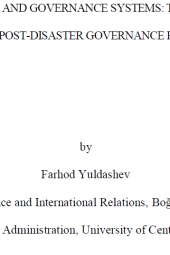Natural Disasters and Governance Systems: The Sociotechnical Foundations of Post-Disaster Governance Reforms in Nepal
Summary
This dissertation research examines this question and proposes that natural disasters trigger new forms of cooperation and conflict in a disaster-stricken society, leading to changes in rules, structures, and behaviors of the governance system.
This dissertation follows a structured framework to explore post-disaster governance reforms in Nepal, focusing on the aftermath of the 2015 earthquakes. Chapter 2 reviews theoretical frameworks in social and policy sciences, establishing a conceptual model for post-disaster governance reform. Chapter 3 outlines the research design, data sources, and analytical techniques. Chapter 4 contextualizes Nepal within low-income, fragile states, detailing the evolution of its governance system and challenges post-earthquakes. Chapters 5 to 8 analyze various aspects, including the disaster response network, resource capacity, governance system adaptation, and inter-organizational connectivity. The dissertation concludes in Chapter 9 by summarizing findings, discussing contributions, acknowledging limitations, and providing recommendations for future research.
Categories:
Research Paper
Publisher:
University of Pittsburgh
Published Year:
2018
